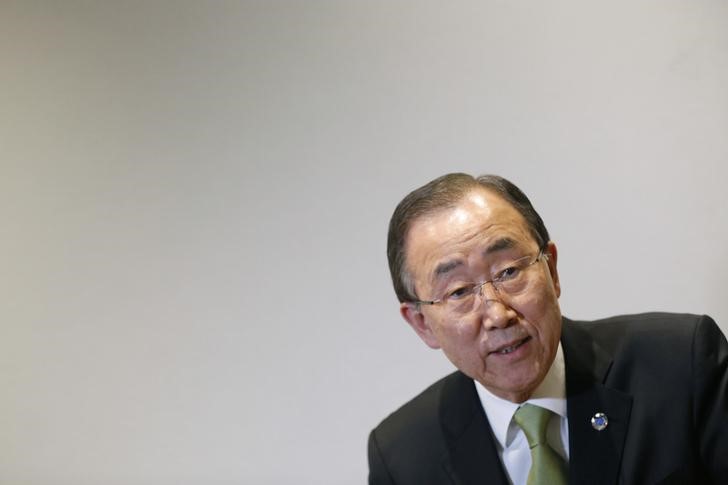By Alister Doyle and Bruce Wallace
PARIS (Reuters) - U.N. Secretary-General Ban Ki-moon was among the most jubilant - and most relieved - of the leaders raising their arms on a stage on Saturday to celebrate a historic agreement on climate change.
For almost a decade, Ban, 71, has travelled the world from the glaciers of Antarctica to corporate boardrooms in New York in search of photo opportunities and allies to secure an elusive global deal to curb global warming.
Saturday night marked a personal victory after a long, often thankless road, in stark contrast to a failed 2009 climate summit in Copenhagen when he sat glumly on the podium at a fractious all-night session as the meeting unravelled.
"This is the apex of multilateralism," he told Reuters of the deal reached in Paris among 195 countries that aims to end the fossil fuel era by phasing out greenhouse gases this century to rein in the rise in temperatures.
"(It is) a decisive turning point in our common efforts to make the lives of peoples sustainable and prosperous as well as a healthy planet," Ban said.
"We have to make sure that all these agreements should be implemented. I will spare no efforts until the last day of my term as secretary-general," he said.
Ban, now widely praised by governments for his tireless focus on climate change, will host a signing ceremony for the deal on April 22, 2016, and follow that with a meeting in May to encourage actions by governments, businesses and civil society.
The road to that signing has had more downs than ups.
Ban said some of his key staff advised him when he took office in 2007 that his plan to focus on climate change - among challenges such as wars, economic upheaval and pandemics - would be risky with no guarantee of success.
He ignored that advice.
Among unexpected bright spots, he once won encouragement from former U.S. president George W. Bush, whose Republican administration often raised doubts about the science underpinning global warming.
BALI
At a U.N. climate conference in Bali, Indonesia, in 2007, when Bush was in office, the United States was the last nation to drop opposition to a plan to launch two years of talks that led to the ill-starred Copenhagen summit. The U.S. delegation was even booed by other delegates for opposing the plan.
Ban said Bush confided to him at a private farewell lunch towards the end of the president's term in 2009 that the U.S. delegation leader had phoned him from Bali for advice.
Bush told her, "'I would appreciate if you do it as the Secretary-General of the United Nations wants'," Ban said. "Then the U.S. agreed to this Bali roadmap. That was the most memorable and touching moment for me."
But Bali led nowhere, because the 2009 Copenhagen summit two years later collapsed. Left-wing Latin American nations and Sudan blocked a deal in a riotous final overnight session. Ban calls Copenhagen among the "frustrating moments".
Still, he said "I never was deterred" even though many other world leaders gave up on climate change to focus on other issues such as fixing the financial crisis.
And in Copenhagen, a simple problem was that world leaders at the time did not appreciate the risks of global warming, from droughts and heat waves to more powerful storms and rising seas.
"They were not even fully educated," Ban said.
But the rubble of Copenhagen did provide a basis for success in Paris, he said. Ban has hosted three summits of his own on climate change since 2007, and joined a march of what he said was 400,000 people in New York last year.
The U.N. leader grew up in a home in South Korea with no electricity and reading by a kerosene lamp.
That made him aware of the dilemma for many developing nations, where governments are trying to widen public access to electricity - usually from cheap, dirty coal-fired power plants - even as they try to cut emissions.

"I myself know all of these climate problems," he said.